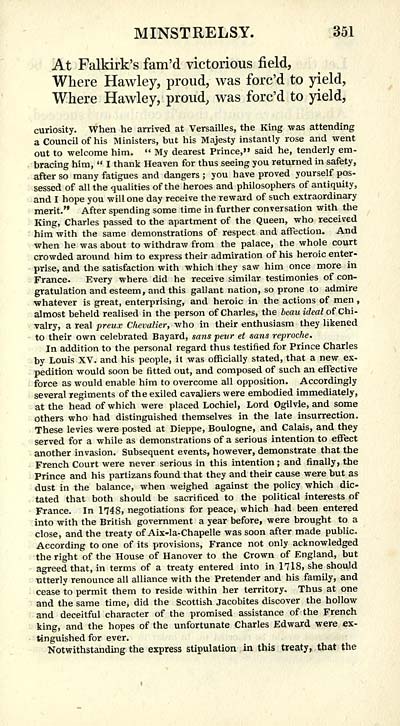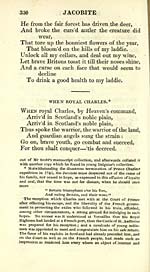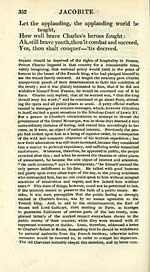Glen Collection of printed music > Printed text > Jacobite minstrelsy
(373) Page 351
Download files
Complete book:
Individual page:
Thumbnail gallery: Grid view | List view

MINSTRELSY. 351
At Falkirk's fam'd victorious field,
Where Hawley, proud, was forc'd to yield,
Where Hawley, proud, was forc'd to yield,
curiosity. When he arrived at Versailles, the King was attending
a Council of his Ministers, but his Majesty instantly rose and went
out to welcome him. " My dearest Prince," said he, tenderly em-
bracing him, " I thank Heaven for thus seeing you returned in safety,
after so many fatigues and dangers ; you have proved yourself pos-
sessed of all the qualities of the heroes and philosophers of antiquity,
and I hope you will one day receive the reward of such extraordinary
merit." After spending some time in further conversation with the
King, Charles passed to the apartment of the Queen, who received
him with the same demonstrations of respect and affection. And
when he was about to withdraw from the palace, the whole court
crowded around him to express their admiration of his heroic enter-
prise, and the satisfaction with which they saw him once more in
France. Every where did he receive similar testimonies of con-
gratulation and esteem, and this gallant nation, so prone to admire
whatever is great, enterprising, and heroic in the actions of men ,
almost beheld realised in the person of Charles, the beau ideal of Chi-
valry, a real preux Chevalier, who in their enthusiasm they likened
to their own celebrated Bayard, sans peur et sans reproche.
In addition to the personal regard thus testified for Prince Charles
by Louis XV. and his people, it was officially stated, that a new ex-
pedition would soon be fitted out, and composed of such an effective
force as would enable him to overcome all opposition. Accordingly
several regiments of the exiled cavaliers were embodied immediately,
at the head of which were placed Lochiel, Lord Ogilvie, and some
others who had distinguished themselves in the late insurrection.
These levies were posted at Dieppe, Boulogne, and Calais, and they
served for a while as demonstrations of a serious intention to effect
another invasion. Subsequent events, however, demonstrate that the
French Court were never serious in this intention ; and finally, the
Prince and his partizans found that they and their cause were but as
dust in the balance, when weighed against the policy which dic-
tated that both should be sacrificed to the political interests of
France. In 1148, negotiations for peace, which had been entered
into with the British government a year before, were brought to a
close, and the treaty of Aix-la-Chapelle was soon after made public.
According to one of its provisions, France not only acknowledged
the right of the House of Hanover to the Crown of England, but
agreed that, in terms of a treaty entered into in 1718, she should
utterly renounce all alliance with the Pretender and his family, and
cease to permit them to reside within her territory. Thus at one
and the same time, did the Scottish Jacobites discover the hollow
and deceitful character of the promised assistance of the French
king, and the hopes of the unfortunate Charles Edward were ex-
tinguished for ever.
Notwithstanding the express stipulation in this treaty, that the
At Falkirk's fam'd victorious field,
Where Hawley, proud, was forc'd to yield,
Where Hawley, proud, was forc'd to yield,
curiosity. When he arrived at Versailles, the King was attending
a Council of his Ministers, but his Majesty instantly rose and went
out to welcome him. " My dearest Prince," said he, tenderly em-
bracing him, " I thank Heaven for thus seeing you returned in safety,
after so many fatigues and dangers ; you have proved yourself pos-
sessed of all the qualities of the heroes and philosophers of antiquity,
and I hope you will one day receive the reward of such extraordinary
merit." After spending some time in further conversation with the
King, Charles passed to the apartment of the Queen, who received
him with the same demonstrations of respect and affection. And
when he was about to withdraw from the palace, the whole court
crowded around him to express their admiration of his heroic enter-
prise, and the satisfaction with which they saw him once more in
France. Every where did he receive similar testimonies of con-
gratulation and esteem, and this gallant nation, so prone to admire
whatever is great, enterprising, and heroic in the actions of men ,
almost beheld realised in the person of Charles, the beau ideal of Chi-
valry, a real preux Chevalier, who in their enthusiasm they likened
to their own celebrated Bayard, sans peur et sans reproche.
In addition to the personal regard thus testified for Prince Charles
by Louis XV. and his people, it was officially stated, that a new ex-
pedition would soon be fitted out, and composed of such an effective
force as would enable him to overcome all opposition. Accordingly
several regiments of the exiled cavaliers were embodied immediately,
at the head of which were placed Lochiel, Lord Ogilvie, and some
others who had distinguished themselves in the late insurrection.
These levies were posted at Dieppe, Boulogne, and Calais, and they
served for a while as demonstrations of a serious intention to effect
another invasion. Subsequent events, however, demonstrate that the
French Court were never serious in this intention ; and finally, the
Prince and his partizans found that they and their cause were but as
dust in the balance, when weighed against the policy which dic-
tated that both should be sacrificed to the political interests of
France. In 1148, negotiations for peace, which had been entered
into with the British government a year before, were brought to a
close, and the treaty of Aix-la-Chapelle was soon after made public.
According to one of its provisions, France not only acknowledged
the right of the House of Hanover to the Crown of England, but
agreed that, in terms of a treaty entered into in 1718, she should
utterly renounce all alliance with the Pretender and his family, and
cease to permit them to reside within her territory. Thus at one
and the same time, did the Scottish Jacobites discover the hollow
and deceitful character of the promised assistance of the French
king, and the hopes of the unfortunate Charles Edward were ex-
tinguished for ever.
Notwithstanding the express stipulation in this treaty, that the
Set display mode to: Large image | Transcription
Images and transcriptions on this page, including medium image downloads, may be used under the Creative Commons Attribution 4.0 International Licence unless otherwise stated. ![]()
| Special collections of printed music > Glen Collection of printed music > Printed text > Jacobite minstrelsy > (373) Page 351 |
|---|
| Permanent URL | https://digital.nls.uk/87930315 |
|---|
| Description | Scottish songs and music of the 18th and early 19th centuries, including music for the Highland bagpipe. These are selected items from the collection of John Glen (1833 to 1904). Also includes a few manuscripts, some treatises, and other books on the subject. |
|---|
| Description | The Glen Collection and the Inglis Collection represent mainly 18th and 19th century Scottish music, including Scottish songs. The collections of Berlioz and Verdi collected by bibliographer Cecil Hopkinson contain contemporary and later editions of the works of the two composers Berlioz and Verdi. |
|---|

